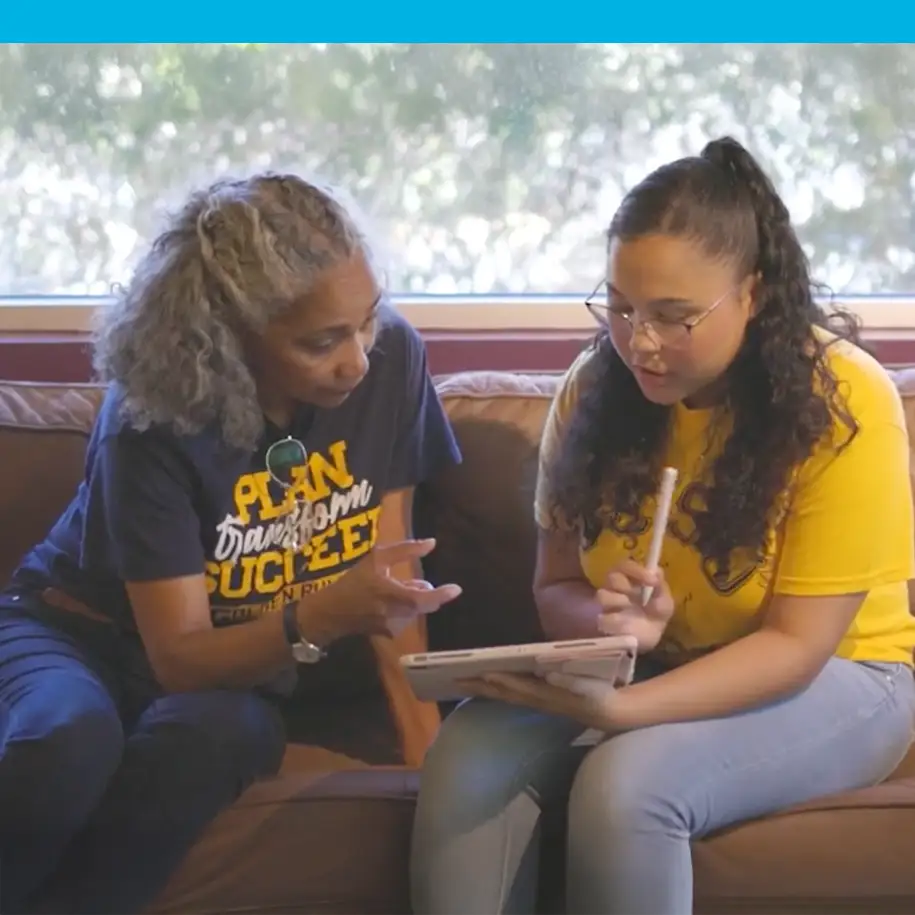
A sophomore’s advice for incoming freshmen
College is a unique time of transition, transformation and new experiences that can be challenging for many students — particularly if you don’t have someone to turn to for advice. First-year college students, in particular, often need advice as they wonder about what to expect from their transition to higher education. To share some advice for rising freshmen students, sociology major and Baton Rouge-native Brandon Vincent sat for an interview to discuss what he learned during his first year at Loyola University New Orleans. He explains why finding a major he’s passionate about, getting involved in the Loyola community, and connecting with support resources like his InsideTrack-trained coach Tracey already have him excited to return for sophomore year.
Where did you get advice from during your first year?

I was lucky enough to have older students as mentors who were able to give me advice about how to be a good student and how to make the most of my college experience.
I also had Tracey, my student success coach, who helped me learn about the opportunities available at Loyola, set academic and personal goals, and create plans and strategies to help me achieve them. With help from my coach and mentors, I was able to have a great freshman year at Loyola and can’t wait to return to New Orleans for my sophomore year in the fall.
How did you find older students to be your mentors?
Joining different campus groups provides great opportunities for first-year students to meet upperclassmen. In my case, I became friends with a lot of older students by joining the Black Student Union.
As I got to know more upperclassmen, I found that they are happy to share what they have learned and have become great sources of advice.
How did you choose your major?
When selecting what to study at Loyola, I wanted to find something that I would be passionate about studying. Growing up in Baton Rouge, I’ve seen the inequality in our healthcare system. A lot of people in Baton Rouge — especially low-income people — just don’t have access to adequate healthcare. Hospitals are being closed down in low-income neighborhoods, forcing people to go across town just to get healthcare or see a doctor. I just see that as a really huge problem and have become extremely passionate about these issues. So, at Loyola, I looked for classes that would help me learn more about how inequality forms in our society and how community activism might provide a pathway to a more equitable healthcare system. With this in mind, sociology classes were a perfect fit.
Why was sociology such a good fit?
In my sociology classes, I learn how activists spark real reform and make a lasting, significant difference for a community. As part of my classes’ service-learning components, I’ve begun working with local New Orleans community groups providing me a great opportunity to practice what I’m learning and gain real-world experience while also making a positive social impact.
How does this help you succeed academically?
Taking classes that directly relate to what I want to do once I graduate makes it easier to focus on my studies and be an active, engaged participant in my classes. It’s a lot easier to wake up for an early class or stay a little bit longer at the library when you love your subject.Whatever your passions may be, try to find classes that connect to them.
Any advice about how to make friends in college?
Like a lot of college freshmen, the beginning of my first semester was a bit hard for me socially.I was really nervous about making friends and wasn’t sure how to meet new people in college. So, for the first few weeks, I kept to myself and didn’t go to a lot of the different events taking place on campus. However, once they started having signups for different campus organizations, I went out and said, “If I actually want to make friends and actually be a little involved on campus, this is the time to do so.” So, I got involved and started signing up for organizations.
As I joined campus organization like the Black Student Union and participated in programs like the Emerging Leaders Program, I met people, made some new friends, and have become a much more social person — something I am very proud of.
What if a student doesn’t know how to start getting involved?
If you want to get involved, but don’t know where to start, try talking with someone on your campus who can point you in the right direction. In my case, I worked with my success coach, Tracey, to find clubs and other opportunities that were a good fit for me. Tracey was the person I could talk to about anything that was bothering me. Knowing that I had someone on campus who actually cared about how I was feeling helped me feel more connected to school, and encouraged me to find other ways to get involved.
Are there any extracurricular opportunities that students might not think of or know about?
While there a lot of ways to get involved on campus, students should also look for opportunities off-campus that provide an opportunity to get some real-world experience and give back to the local community. For example, through the Black Student Union, I volunteered with a local church. I also participated with Wolves on the Prowl, which is a national volunteer day for Loyola and Loyola alum around the campus, around the country. As I mentioned above, I also worked in the New Orleans community as part of my sociology classes. While I won’t be required to continue this work next year as part of my classes, I still look forward to continuing to work in the New Orleans community.
How do you manage your time?
While I was excited to get involved on and off campus, I still needed to make sure that I didn’t overload myself with extracurriculars and still had the time I needed to do my class work, complete my work study, and accomplish all the other things I need to do. But this can be a lot easier said than done, especially when time management was a skill I struggled with in high school.
Recognizing that this might be an obstacle for me, I worked with Tracey to develop a time management system to help me be successful in both my extracurriculars and my academics. Together, we decided that I could be involved in a certain amount of organizations this semester and that I could do a set amount of workshops while still having the time I need to accomplish my goals. By working with Tracey, I gained important time management skills — addressing one of my issues in high school and preparing myself for success in my freshman year and beyond.
How do you stay healthy while at school?
It’s easy to focus so much on doing well in class, making new friends, and participating in extracurriculars that you don’t take care of yourself and your health. For example, I knew a lot of people who were so busy that they missed meals and didn’t get enough sleep. Other students were so caught up in what they have to do each day that they don’t set aside time to take a step back, relax and think about what they can do to work on themselves.
No matter how busy I got, I tried my best to eat consistent, balanced meals and get enough sleep to ensure that I had the energy to be successful in and out of the classroom during my freshman year.
How did you try to take advantage of the resources available at Loyola?
A lot of universities, like Loyola, have coaches or advisors that are available to students to help them navigate their college experience. I would highly recommend that students take advantage of these opportunities. It’s great to have someone you can meet with about academic issues — or even general life issues — who really cares about you. I’ve built a great relationship with Tracey and am happy to meet with her, even if I don’t have a pressing issue to discuss. Tracey helped me get the most out of all of the resources available to support me. I always checked in with her before seeing my advisor, to make sure I was prepared and knew what I wanted to accomplish.
At Loyola and every college and university, there are a variety of programs that are available to help students, but it is up to students to take the initiative and choose to participate in these programs. I would highly recommend that students take advantage of these opportunities as much as they can.
Any final advice for first year students?
While college can be a very challenging time, it’s also an exciting time filled with new people and new experiences, so enjoy it!
Coaching solutions proven to advance all learners
Whether you’re looking to help students persist through completion or to improve career outcomes for job seekers and employees, our holistic coaching solutions can help you achieve meaningful outcomes.



